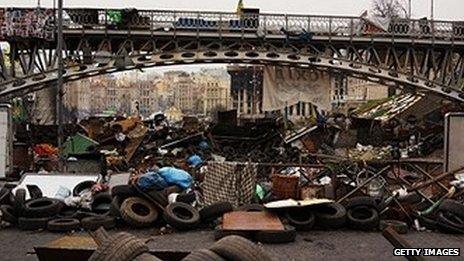In Ukraine: IMF Mr Nice or Nasty?
- Published
- comments

The Barricades in Maidan Square, the scene of months of protests
Is tough love from the West the right economic prescription for Ukraine, as the Russian bear consumes the Crimea and appears to be salivating over the prospect of consuming rather more of that turbulent country?
Or should the International Monetary Fund and other sovereign creditors be a little less insistent that Ukrainians should put on hairshirts as a condition of receiving vital official loans?
The IMF has announced it will provide between $14bn and $18bn over two years, and believes another $10bn or so will be "unlocked" from other international financial organisations and rich countries (such as the EU and Japan).
The provision of new credit is vital. Without it, Ukraine risks not being able to service its external debts in the coming year, of defaulting, and of running out of reserves to pay for imports.
That way lies penury, for a country whose economy has been limp for years.
IMF reforms necessary
Against that background, the IMF's imposed reforms - allowing the currency to float, inflation targeting by the central bank, strengthening banks, tax rises and public spending cuts, the elimination of expensive gas subsidies - are the conventional remedy.
And to demonstrate the wisdom of this prescription, the IMF points out that the deficit on the current account (the gap between Ukraine's income and outgoings with the rest of world) recently became an unsustainable 9% of GDP (high even by UK standards).
Also, the deficit on the budget combined with losses generated by the state owned energy company, Naftogaz, are heading for a high 10% of GDP (which is where the UK's public sector deficit was, ante austerity).
So the status quo is the road to ruin.
Pace of reform
But as ever the debate is all about the sensible pace for the acquisition of economic prudence and fiscal rectitude.
Now on this, the IMF's actions and statement are somewhat ambiguous (ahem).
On the one hand, the Ukrainian government yesterday said it would be whacking up the gas price paid by consumers by an eye-watering 50% (does that make you feel mellower towards British Gas?), citing the looming agreement with the IMF as cause.
On the other, the IMF insists that government spending cuts and tax increases will be "proceeding at a pace commensurate with the speed of economic recovery and protecting the vulnerable".
What does that mean in terms of numbers? Well the IMF wants the fiscal deficit - the gap between government revenues and expenditure - to be halved (more or less) to 2.5% by 2016.
Which is slower retrenchment than planned in the UK. But then the UK is considerably richer, and does not face elections - as Ukraine does - on May 25, which will determine (in part) whether the country has a stable democratic future.
So is this an occasion, where the West and its official financial institutions, could and should be a little more conspicuously generous - such that they (we?) should offer the Ukrainians more carrot, especially since there is little appetite to brandish an intimidating stick against the Russians?